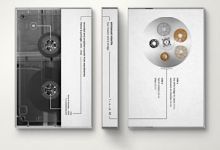
Emmanuel Mieville - Four Towers and a Bridge [Forms of Minutiae - 2023]Four Towers and a Bridge, is a direct outcome of this technical heritage." /> |
The operations of musique concrète are by now a cauterized field of their own, owing in part to their historical weight (post factum) and the institutionalization of the studios from which they originally emerged (now known as the GRM in Paris). European genealogies of electronic music often move through institutions, and musique concrète is exemplary in this regard, though the "true" origin of the practice of manipulating pre-recorded material belongs to Halim El-Dabh, but that's another story altogether. In the relatively porous landscape of electroacoustic experimentation, nearly every artist who uses field recordings is de facto acknowledging a debt to the origins of this practice, regardless of the specific transformations in recording and playback technologies. Emmanuel Mieville cut his teeth in the very studios where musique concrète was born, and his latest release, Four Towers and a Bridge, is a direct outcome of this technical heritage. The funny thing about musique concrète as a practice is that the results, as intended on "albums" such as Four Towers and a Bridge, is that they can almost always be judged along two axes: a structural and an aesthetic one. This may at first appear reductionist, for their is almost always an overlap of one axis with the other, but this crude distinction allows one to characterize not only the methods employed, but their results as well. In short, there is musique concrète that aims at a kind of aesthetic of the pre-recorded (the genre's a priori) and another approach that makes uses of field recordings to open up some kind of structural chasm within the compositional process itself. All of this is to say that I am unsure which camp Mieville belongs to, in the end, and my guess is that is because the actual "music" on Four Towers and a Bridge is itself unsure, wanting to have the proverbial cake and eat it too. My reasoning is based on the fact that Mieville's four, intricately woven tracks, follow a similar logic throughout their unfolding – from sparse to congested – often ending in a crescendo that undergirds the durational character of listening itself. This predictability casts a shadow over what should be an otherwise enjoyable release. There is nothing worse than knowing ahead of time what is around the next bend in the road, setting aside the particular technologies that got us there. This is the great irony of Four Towers and a Bridge: that an album predicated on the media of transit – elevators, trains, bridges – should deliver something that, musically, returns again and again to the passage of time as experienced over the course of listening, putting the aesthetic effect ahead of the deconstructive nature of musique concrète's structure.
For fans of transit-based field recordings, musique concrète, and other electroacoustic experimentalism. For more info       Colin Lang Colin Lang
|

